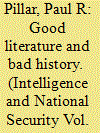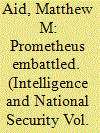|
|
|
Sort Order |
|
|
|
Items / Page
|
|
|
|
|
|
|
| Srl | Item |
| 1 |
ID:
076351


|
|
|
|
|
| Publication |
2006.
|
| Summary/Abstract |
In a climate of political concern about the deliberate dissemination of pathogenic micro-organisms, this article assesses the nature and scope of the threat to national security posed by actors other than states. Key factors include the motivations and disincentives for carrying out a biological attack and the technical challenges likely to be encountered by a non-state organization that decides to use disease as its weapon of choice. The assessment concludes that non-state organizations do not at present pose a great threat, that biological attacks should generally not be regarded as a 'WMD' issue, but also that the conduct of individual scientists engaged in pathogen research warrants careful monitoring.
|
|
|
|
|
|
|
|
|
|
|
|
|
|
|
|
| 2 |
ID:
076356


|
|
|
|
|
| Publication |
2006.
|
| Summary/Abstract |
Uncritical acceptance of the findings of the 9/11 Commission has obscured how the commission intentionally misrepresented pre-attack strategic intelligence on the threat from Al Qaeda. The commission staff used such techniques as highly selective use of material, partial truths, irrelevant references, plays on words, quotations out of context, and suggestive language leading to false inferences to portray as weak what had been a strong strategic analytical performance. The commission's misrepresentation corrupted history, damaged public understanding of the role of intelligence in counterterrorism, and helped to build support for a reorganization scheme that has made US counterterrorist intelligence worse rather than better.
|
|
|
|
|
|
|
|
|
|
|
|
|
|
|
|
| 3 |
ID:
076355


|
|
|
|
|
| Publication |
2006.
|
| Summary/Abstract |
This article is occasioned by public interest in reported tensions between CIA analysts and policymaking officials of the administration of President George W. Bush regarding the significance of ties between the Saddam Hussein regime and Al Qaeda terrorists, an important factor in the US decision to invade Iraq in 2003. No evaluation of the latter case is provided. The article addresses, instead, general patterns of tensions between intelligence analysts and policy officials in order to provide context for public assessment of the Iraq-Al Qaeda incident when the public record is more complete and enhance understanding of similar future instances of tension.
|
|
|
|
|
|
|
|
|
|
|
|
|
|
|
|
| 4 |
ID:
076354


|
|
|
|
|
| Publication |
2006.
|
| Summary/Abstract |
Five years after the tragic events of September 11, 2001, the National Security Agency (NSA) has risen to the position of being the largest and most powerful intelligence agency in the US. Working in close conjunction with its English-speaking partners overseas, NSA is today the most prolific producer of top-quality intelligence information reaching senior US government policymakers and field commanders. But press reports over the past year concerning the Agency's controversial domestic eavesdropping program and problem-plagued modernization effort, have raised serious questions once again about the competency of the Agency's long-troubled management practices, as well as whether NSA, at the behest of the Bush administration, exceeded its legal authority by extending its operations into the US for the first time since the mid-1970s in contravention of the Foreign Intelligence Surveillance Act (FISA) of 1978.
|
|
|
|
|
|
|
|
|
|
|
|
|
|
|
|
| 5 |
ID:
076352


|
|
|
|
|
| Publication |
2006.
|
| Summary/Abstract |
Few spy cases during the Cold War have such an international flavour as the Wennerström spy case - a neutral Swedish attaché spying on the West for the benefit of the East. Even 40 years later, however, the literature available on the case suffers from a Swedish bias and has generally received little scholarly treatment. Therefore, this article aims to describe and analyse the Wennerström spy case from a Western perspective, based on new declassified sources as well as the most recent research available in Swedish. Among other things, the article demonstrates that the investigation after Wennerström's arrest took place in close cooperation with primarily American and British intelligence services, that Wennerström's allegation of being a double agent was either false or greatly exaggerated, and, finally, that the damage done to Western interests due to his espionage was greater than portrayed in the existing literature.
|
|
|
|
|
|
|
|
|
|
|
|
|
|
|
|
| 6 |
ID:
076353


|
|
|
|
|
| Publication |
2006.
|
| Summary/Abstract |
In the modern era, almost all intelligence professionals will study the Intelligence Cycle as a kind of gospel of how intelligence functions. Yet it is not a particularly good model, since the cyclical pattern does not describe what really happens. Policy officials rarely give collection guidance. Collection and analysis, which are supposed to work in tandem, in fact work more properly in parallel. Finally, the idea that decision makers wait for the delivery of intelligence before making policy decisions is equally incorrect. In the modern era, policy officials seem to want intelligence to support policy rather than to inform it. The Intelligence Cycle also fails to consider either counter-intelligence or covert action. Taken as a whole, the cycle concept is a flawed model, but nevertheless continues to be taught in the US and around the world.
|
|
|
|
|
|
|
|
|
|
|
|
|
|
|
|
|
|
|
|
|